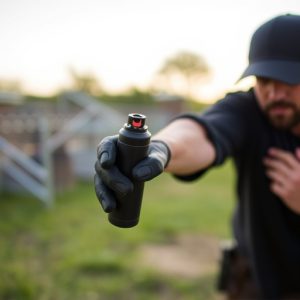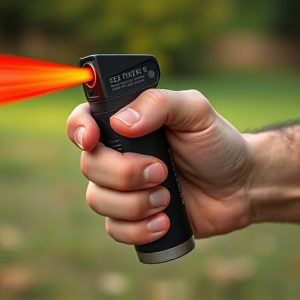Capsaicin Deterrent Spray: Effectiveness & Legalities State-by-State
Capsaicin, the spicy compound in chili peppers, makes pepper spray an effective anti-inflammatory ag…….
Capsaicin, the spicy compound in chili peppers, makes pepper spray an effective anti-inflammatory agent and popular self-defense tool. However, navigating Pepper Spray Laws by State is crucial for legal adherence and personal safety. US states have varying regulations regarding who can possess, carry, and use pepper spray, with age restrictions, permit requirements, and permitted uses differing significantly. Understanding these laws ensures responsible usage and helps avoid legal issues related to this potent deterrent.
“Discover the power of capsicum as a deterrent with Capsaicin Inflammatory Agent Deterrent Spray. This article provides an in-depth look at pepper spray, its active ingredient, and how it works. We’ll explore the chemical composition of capsicum and its effectiveness as a non-lethal self-defense option. Additionally, our guide delves into the legal landscape of pepper spray across different states, ensuring you’re informed about local regulations. Learn about safety measures, proper usage, and best practices to maximize its deterrence potential.”
- Understanding Capsaicin: The Chemical Composition and Its Properties
- Pepper Spray Laws by State: A Comprehensive Overview
- How Does Capsaicin Inflammatory Agent Deterrent Spray Work?
- Safety, Legal Implications, and Best Practices for Using Pepper Spray
Understanding Capsaicin: The Chemical Composition and Its Properties
Capsaicin, the active ingredient in pepper spray, is a natural compound derived from chili peppers. This chemical agent is responsible for the spicy sensation we experience when eating certain varieties of peppers. Beyond its culinary use, capsaicin has gained significant attention as an inflammatory deterrent due to its unique properties. Its molecular structure disrupts cellular signaling pathways, leading to localized inflammation and pain response when contacted.
Understanding the chemistry behind capsaicin is crucial in navigating Pepper Spray Laws by State. Each state has varying regulations regarding the possession, use, and application of pepper spray, reflecting public safety concerns and local sentiments. This chemical’s potency as an deterrent makes it a popular choice for self-defense, law enforcement, and even animal management, further underscoring the need for informed understanding and compliance with legal guidelines.
Pepper Spray Laws by State: A Comprehensive Overview
The regulations surrounding pepper spray, also known as capsaicin inflammatory agent deterrent spray, vary significantly across different states in the US. Understanding pepper spray laws by state is crucial for both personal safety and legal compliance. Each state has its own set of rules dictating who can possess, carry, and use these products, with variations in age restrictions, permit requirements, and permitted uses.
For instance, some states allow pepper spray for self-defense without a permit, while others mandate a background check and training. Certain jurisdictions restrict the type of pepper spray allowed, focusing on strength or concentration, and some have specific prohibitions against carrying it in certain places like schools or public gatherings. Staying informed about these pepper spray laws by state ensures responsible use and avoids legal repercussions.
How Does Capsaicin Inflammatory Agent Deterrent Spray Work?
Capsaicin inflammatory agent deterrent spray works by exploiting the sensitive nature of our skin and eyes to capsaicin, the active ingredient found in chili peppers. When sprayed, capsaicin directly irritates the nervous system, specifically targeting pain receptors. This triggers a series of reactions, including increased heart rate and sweating, as the body attempts to flush out the irritant. The intense heat and stinging sensation associated with pepper spray can deter potential threats, providing a powerful non-lethal defense option.
Understanding Pepper Spray Laws by State is crucial when considering the use of such deterrents. Each state in the US has its own regulations governing the possession, use, and sale of pepper spray, so it’s essential to check local laws before purchasing or carrying any form of self-defense spray. These laws can dictate who can buy and carry pepper spray, where it can be used, and even the concentration levels allowed. Adhering to these rules ensures responsible usage and minimizes legal repercussions.
Safety, Legal Implications, and Best Practices for Using Pepper Spray
Using pepper spray, or capsaicin inflammatory agent deterrent spray, requires a thoughtful approach due to its potency and legal implications. Safety is paramount; it’s crucial to understand that pepper spray can cause severe irritation, breathing difficulties, and even temporary blindness in some cases. Always follow best practices, such as aiming for non-sensitive areas like eyes and face, keeping a safe distance, and ensuring proper training on usage.
Legally, Pepper Spray Laws by State vary widely. It’s essential to research and comply with local regulations before carrying or using pepper spray publicly. Unlawful possession or use can lead to severe penalties. Be mindful that some states have restrictions on who can carry pepper spray, where it can be used, and how much is allowed. Understanding these laws is vital to avoiding legal trouble and ensuring responsible usage.
In conclusion, pepper spray, primarily composed of capsaicin, serves as a powerful deterrent for various situations, especially in personal safety. Understanding both its chemical composition and the varying legal landscape of pepper spray across different states is paramount. Knowing the appropriate use, safety precautions, and legal implications ensures that individuals can protect themselves effectively while adhering to local regulations. Staying informed about Pepper Spray Laws by State is crucial for responsible usage, making it a valuable tool in personal defense.


